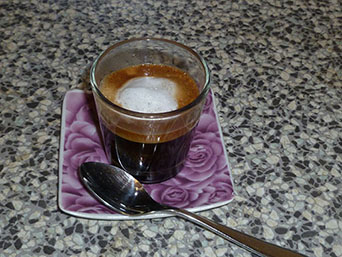2 Italian pronunciation of c and ch
This section will guide you in pronouncing some important food and drink words in the the right way.
Pronunciation: c, ci and ch
The letter c has a ‘soft’ sound before i or e. It is pronounced /tʃ/, as in the English word ‘church’:
cappuccino
The letter c has a hard sound before a, o or u. It is pronounced /k/, as in the English word ‘cat’:
caffè
The letter combination ch always has a hard sound. It is pronounced /k/, as in the English word ‘cat’:
bicchiere
Note that the same rule applies regardless whether the word is spelled with a single or a double c.
Activity 3
Now listen to each audio clip below and repeat, paying particular attention to the different ways in which the letter c is pronounced.. Record yourself and compare your recording to the original.
1

Transcript
Listen
una cioccolata
2

Transcript
Listen
un'aranciata
3

Transcript
Listen
un bicchiere di vino
4

Transcript
Listen
un cappuccino
5

Transcript
Listen
un caffè
6

Transcript
Listen
un cornetto
7

Transcript
Listen
un caffè macchiato
8

Transcript
Listen
un succo di frutta
Activity 4
A group of friends are ordering drinks from a waiter. Listen to the audio track and identify the drinks mentioned. Then write down the names of the drinks in Italian.
Transcript
Listen to a group of friends ordering drinks from a waitress and try to identify what drinks they are ordering.
Answer
The drinks mentioned are: una birra, un caffè, un bicchiere di vino bianco, un tè and un succo di frutta.
Culture: Per favore, grazie, prego
The expression per favore (‘please’) is used much less often than ‘please’ is in English. It is not considered impolite to omit per favore when asking for something.
On the other hand, grazie (‘thank you’) is used often.
It is customary to respond to grazie by saying prego. This means ‘not at all / you’re welcome / don’t mention it’ (the literal meaning is ‘I beg you’) but is used more routinely than these equivalent English expressions.
Later you will come across several other meanings of prego, which vary according to the context, such as ‘Can I help you?’, ‘Come in’, ‘Do sit down’ and ‘After you’.
